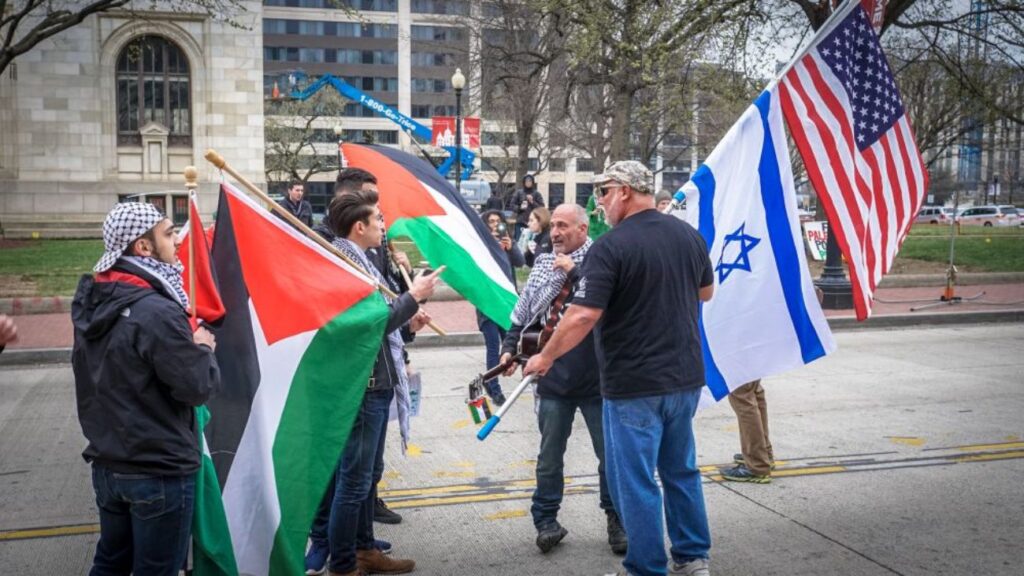Israel-Palestine Conflict: The Precursor to World War 111

I am convinced that the current crisis between Israel and the Palestinians in Gaza will only worsen, leading to regional and even international tensions. The war between Israel and the Palestinians in Gaza has the potential to expand and produce tensions that might effect the larger Middle Eastern and even world geopolitics, as I believe passionately. Noting that this may be a prelude to a “Third World War” is not an outlandish or improbable prediction. Wars on a global scale are fought between big powers or are the result of poorly handled wars on a regional scale.
However, the Israel-Palestine conflict might exacerbate regional tensions in the following ways:
1. The Israel-Palestine conflict is being utilized as a proxy issue by regional nations. For instance, while the United States backs Israel, Iran backs Hamas and other Palestinian groups. The current crises in the Middle East might be made much worse if tensions were to rise.
2. Cross-Border Conflicts: If the Israel-Palestine conflict escalates, it might easily spread to neighboring nations. This might lead to even more instability in the area.
3. Opinion Polls and Global Radicalization The ongoing war has the potential to radicalize people and groups all over the world, which might lead to terrorist attacks or civil unrest in a variety of nations. This has the potential to undermine global peace and safety.
4. Diplomatic tensions can arise as a result of the Israel-Palestine conflict. The United Nations and the Middle East Quartet’s efforts to mediate and settle the conflict may encounter difficulties or fail.
As an example, let’s discuss the tensions between Israelis and Palestinians. Israel is a country in the Middle East that has been at odds with Hamas, a Palestinian terrorist group, for quite some time. Many people in the area are upset and frustrated because of this disagreement.
Many Palestinians are said to have been killed in a recent blast at a hospital in Gaza. Many Palestinians who had gone to the hospital for treatment or protection were murdered in the blast. Palestinian officials claimed an Israeli attack on the hospital, while the Israeli government insisted that the incident was actually an accident brought on by a rocket fired by the Palestinian organization Islamic Jihad.
Many people in the Middle East became quite angry with Israel because of these and other events. They believe Israel is unfairly abusing Palestinians. Many Palestinians have been hurt by Israeli bombings and the cutting off of basic services including water, medication, and power in the Gaza Strip.
Some in the Middle East believe that the United States supports Israel too strongly and is indifferent to Palestinian suffering. This has infuriated them to the point that they are uttering anti-American chants like “Death to America.”
Many individuals have strong feelings about how the United States is backing Israel in this war, and many others are angry about how Israel is treating the Palestinians.
This war has lasted for a long time, and it has become a sensitive topic for many locals. Tragically, a hospital in Gaza was recently attacked. A large explosion killed several Palestinians who had gathered to seek shelter or medical attention. Israeli authorities blamed a Palestinian organization known as Islamic Jihad for the incident, while Palestinians blamed Israel.
Many people in the Middle East still don’t trust Israel’s version of events, even after all the proof has been revealed. People in nations including Jordan, Lebanon, Yemen, and Oman staged protests in which they voiced their condemnation of Israel.
People in the area were already quite worried about the fighting before this hospital episode occurred. The Palestinians in the blockaded Gaza Strip were seen by many as the only losers in this conflict. Many Palestinians had died because Israel had shut off their access to lifesaving resources like water, medicine, and power, and had also killed them with airstrikes.
Some argue that the United States gives insufficient attention to the plight of Palestinians by vigorously supporting Israel. The United States’ pledge of continuous support for Israel is one factor contributing to rising tensions in the area. A ground invasion of Gaza by Israel is a real possibility, according to some.
Even in nations that are strong friends of the United States, the term “Death to America” has returned in protests in this sensitive situation. The United States is being urged to take action in response to reports of horrific atrocities being committed against Palestinians.
The comments of high-ranking Israeli and American politicians have had a significant impact on the lives of many Palestinians and other Arabs. They feel the discourse has been inhumane and full of calls to start a conflict.
Because to the growing danger, U.S. The tolerant attitudes of President Biden and Secretary of State Antony J. Blinken toward Israel’s military response to the Hamas strikes have enraged many in the Middle East.
Palestinian negotiator Diana Buttu was taken aback by the United States’s answer. Her assessment of the United States’ stance on the Israel conflict was that “this level of siding with Israel is genocidal.”
Many in the broader Middle East don’t view Israel as a helpless victim of unjustified attacks, but rather as an occupation backed by the United States. Some in this group hold the view that Western powers have accepted Israel’s account of events without scrutiny.
Saudi thinker Khalid Al-Dakhil has spoken out against Western countries’ backing for Israel. He pondered why the international community doesn’t take a firmer stance against the Israeli occupation. He suggested talking things out as a way to end the Palestinian-Israeli conflict.
Despite the appointment of a special envoy by the U.S. State Department to deal with the issue in Gaza, many in the area believe that America’s reputation has been irreparably damaged. They think the United States’ position on the crisis has damaged its moral credibility in the Middle East.
Israeli military leaders are reportedly discussing the possibility of a ground invasion of Gaza, and senior American commanders are offering their insights gained during battles such as the struggle for Falluja in Iraq. The Israelis are benefiting from these lessons as well.
There are parallels to be drawn between the current climate and the time immediately following the September 11th, 2001 terrorist attacks and before the 2003 American invasion of Iraq. Similar feelings and tensions may be sensed across the area.
Many Iraqis, who are still recovering from the effects of the war, are exhausted by the unfolding situation in Israel and Gaza. Feelings of frustration and rage coexist. Some argue that the United States puts its own interests ahead of Arab lives.
A comprehensive and viable peace plan for the Israeli-Palestinian conflict involves careful study of the historical backdrop, the complaints of both sides, and the larger geopolitical forces in the area, making it a difficult and delicate endeavor.
In what form may a peace agreement take?
Certainly, I can sketch out the skeleton of a peace proposal. Please keep in mind that the willingness of both sides to talk to each other and make major concessions is crucial to the success of any peace agreement.
Keep in mind that there are many facets to the Israeli-Palestinian conflict, and that it has persisted for decades despite attempts to find a solution. A two-state solution that ensures the security and self-determination of both sides should be the ultimate goal of any successful peace proposal, and this can only be achieved by addressing the basic grievances and ambitions of both Israelis and Palestinians. The following outline provides a foundation for thinking about what makes up such a strategy.
1. Accord and Completion:
There has to be an official acknowledgment from both Israel and Palestine of the other’s right to exist as a sovereign state, although within mutually agreed-upon international borders.
Acknowledging each other’s humanity necessitates giving up violence as a tool for political change.
2. Changes to Boundaries and Territories:
Talk about land swaps and come to an agreement on where Israel’s and Palestine’s borders should be, taking into account the borders from before 1967.
Build a wall that is strong enough to protect both countries’ borders.
3. The Two-State Approach:
Make sure that Palestine is viable and contiguous, and that Israel is safe and autonomous.
East Jerusalem should be recognized as the capital of Palestine and West Jerusalem as the capital of Israel, with Jerusalem itself serving as the common capital of both governments.
4. Safeguarding Measures:
Make sure both countries are secure and stable by creating a detailed security strategy.
Build in international checkpoints to make sure everyone is following the safety protocols they agreed upon.
5. Rights of Refugees to Return Home
Compensation, resettlement, and the right of return to a future state of Palestine are all viable solutions to the problem of Palestinian refugees.
Help former refugees and their offspring start over in new places.
6. Growth of the Economy:
Improve living circumstances and foster independence by launching economic development projects in the Palestinian territory.
The economies of Israel and Palestine may benefit from increased international investment.
7. Guarantees on a Global Scale:
Obtain international assurances for the peace plan’s execution and upkeep.
Involve relevant parties such as the United Nations, the Middle East Quartet, and regional entities.
8. Peacebuilding and Learning:
Foster mutual understanding and trust by encouraging Israelis and Palestinians to engage in cultural and educational exchanges.
Create collaborative efforts to confront competing narratives of the past and advance efforts toward healing and unity.
9. Schedule and Checking in:
Create a detailed strategy for how long each phase of the peace process will take and what will constitute success along the way.
In order to ensure that both sides are keeping to their agreements, it is important to establish an international monitoring apparatus. Describing this situation as a prelude to a “Third World War” is not an outlandish or improbable possibility. Wars on a global scale are fought between big powers or are the result of poorly handled wars on a regional scale.
However, the Israel-Palestine conflict might exacerbate regional tensions in the following ways:
1. The Israel-Palestine conflict is being utilized as a proxy issue by regional nations. For instance, while the United States backs Israel, Iran backs Hamas and other Palestinian groups. The current crises in the Middle East might be made much worse if tensions were to rise.
2. Cross-Border Conflicts: If the Israel-Palestine conflict escalates, it might easily spread to neighboring nations. This might lead to even more instability in the area.
3. Opinion Polls and Global Radicalization The ongoing war has the potential to radicalize people and groups all over the world, which might lead to terrorist attacks or civil unrest in a variety of nations. This has the potential to undermine global peace and safety.
4. Diplomatic tensions can arise as a result of the Israel-Palestine conflict. The United Nations and the Middle East Quartet’s efforts to mediate and settle the conflict may encounter difficulties or fail.
As an example, let’s discuss the tensions between Israelis and Palestinians. Israel is a country in the Middle East that has been at odds with Hamas, a Palestinian terrorist group, for quite some time. Many people in the area are upset and frustrated because of this disagreement.
Many Palestinians are said to have been killed in a recent blast at a hospital in Gaza. Many Palestinians who had gone to the hospital for treatment or protection were murdered in the blast. Palestinian officials claimed an Israeli attack on the hospital, while the Israeli government insisted that the incident was actually an accident brought on by a rocket fired by the Palestinian organization Islamic Jihad.
Many people in the Middle East became quite angry with Israel because of these and other events. They believe Israel is unfairly abusing Palestinians. Many Palestinians have been hurt by Israeli bombings and the cutting off of basic services including water, medication, and power in the Gaza Strip.
Some in the Middle East believe that the United States supports Israel too strongly and is indifferent to Palestinian suffering. This has infuriated them to the point that they are uttering anti-American chants like “Death to America.”
Many individuals have strong feelings about how the United States is backing Israel in this war, and many others are angry about how Israel is treating the Palestinians.
This war has lasted for a long time, and it has become a sensitive topic for many locals. Tragically, a hospital in Gaza was recently attacked. A large explosion killed several Palestinians who had gathered to seek shelter or medical attention. Israeli authorities blamed a Palestinian organization known as Islamic Jihad for the incident, while Palestinians blamed Israel.
Many people in the Middle East still don’t trust Israel’s version of events, even after all the proof has been revealed. People in nations including Jordan, Lebanon, Yemen, and Oman staged protests in which they voiced their condemnation of Israel.
People in the area were already quite worried about the fighting before this hospital episode occurred. The Palestinians in the blockaded Gaza Strip were seen by many as the only losers in this conflict. Many Palestinians had died because Israel had shut off their access to lifesaving resources like water, medicine, and power, and had also killed them with airstrikes.
Some argue that the United States gives insufficient attention to the plight of Palestinians by vigorously supporting Israel. The United States’ pledge of continuous support for Israel is one factor contributing to rising tensions in the area. A ground invasion of Gaza by Israel is a real possibility, according to some.
Even in nations that are strong friends of the United States, the term “Death to America” has returned in protests in this sensitive situation. The United States is being urged to take action in response to reports of horrific atrocities being committed against Palestinians.
The comments of high-ranking Israeli and American politicians have had a significant impact on the lives of many Palestinians and other Arabs. They feel the discourse has been inhumane and full of calls to start a conflict.
Because to the growing danger, U.S. The tolerant attitudes of President Biden and Secretary of State Antony J. Blinken toward Israel’s military response to the Hamas strikes have enraged many in the Middle East.
Palestinian negotiator Diana Buttu was taken aback by the United States’s answer. Her assessment of the United States’ stance on the Israel conflict was that “this level of siding with Israel is genocidal.”
Many in the broader Middle East don’t view Israel as a helpless victim of unjustified attacks, but rather as an occupation backed by the United States. Some in this group hold the view that Western powers have accepted Israel’s account of events without scrutiny.
Saudi thinker Khalid Al-Dakhil has spoken out against Western countries’ backing for Israel. He pondered why the international community doesn’t take a firmer stance against the Israeli occupation. He suggested talking things out as a way to end the Palestinian-Israeli conflict.
Despite the appointment of a special envoy by the U.S. State Department to deal with the issue in Gaza, many in the area believe that America’s reputation has been irreparably damaged. They think the United States’ position on the crisis has damaged its moral credibility in the Middle East.
Israeli military leaders are reportedly discussing the possibility of a ground invasion of Gaza, and senior American commanders are offering their insights gained during battles such as the struggle for Falluja in Iraq. The Israelis are benefiting from these lessons as well.
There are parallels to be drawn between the current climate and the time immediately following the September 11th, 2001 terrorist attacks and before the 2003 American invasion of Iraq. Similar feelings and tensions may be sensed across the area.
Many Iraqis, who are still recovering from the effects of the war, are exhausted by the unfolding situation in Israel and Gaza. Feelings of frustration and rage coexist. Some argue that the United States puts its own interests ahead of Arab lives.
A comprehensive and viable peace plan for the Israeli-Palestinian conflict involves careful study of the historical backdrop, the complaints of both sides, and the larger geopolitical forces in the area, making it a difficult and delicate endeavor.
In what form may a peace agreement take?
Certainly, I can sketch out the skeleton of a peace proposal. Please keep in mind that the willingness of both sides to talk to each other and make major concessions is crucial to the success of any peace agreement.
Keep in mind that there are many facets to the Israeli-Palestinian conflict, and that it has persisted for decades despite attempts to find a solution. A two-state solution that ensures the security and self-determination of both sides should be the ultimate goal of any successful peace proposal, and this can only be achieved by addressing the basic grievances and ambitions of both Israelis and Palestinians. The following outline provides a foundation for thinking about what makes up such a strategy.
1. Accord and Completion:
There has to be an official acknowledgment from both Israel and Palestine of the other’s right to exist as a sovereign state, although within mutually agreed-upon international borders.
Acknowledging each other’s humanity necessitates giving up violence as a tool for political change.
2. Changes to Boundaries and Territories:
Talk about land swaps and come to an agreement on where Israel’s and Palestine’s borders should be, taking into account the borders from before 1967.
Build a wall that is strong enough to protect both countries’ borders.
3. The Two-State Approach:
Make sure that Palestine is viable and contiguous, and that Israel is safe and autonomous.
East Jerusalem should be recognized as the capital of Palestine and West Jerusalem as the capital of Israel, with Jerusalem itself serving as the common capital of both governments.
4. Safeguarding Measures:
Make sure both countries are secure and stable by creating a detailed security strategy.
Build in international checkpoints to make sure everyone is following the safety protocols they agreed upon.
5. Rights of Refugees to Return Home
Compensation, resettlement, and the right of return to a future state of Palestine are all viable solutions to the problem of Palestinian refugees.
Help former refugees and their offspring start over in new places.
6. Growth of the Economy:
Improve living circumstances and foster independence by launching economic development projects in the Palestinian territory.
The economies of Israel and Palestine may benefit from increased international investment.
7. Guarantees on a Global Scale:
Obtain international assurances for the peace plan’s execution and upkeep.
Involve relevant parties such as the United Nations, the Middle East Quartet, and regional entities.
8. Peacebuilding and Learning:
Foster mutual understanding and trust by encouraging Israelis and Palestinians to engage in cultural and educational exchanges.
Create collaborative efforts to confront competing narratives of the past and advance efforts toward healing and unity.
9. Schedule and Checking in:
Create a detailed strategy for how long each phase of the peace process will take and what will constitute success along the way.
Establish a global framework for keeping tabs on the parties’ progress and compliance.







